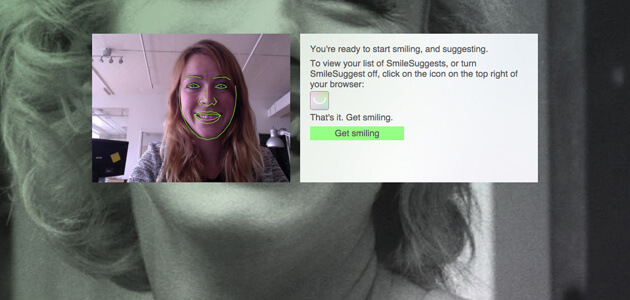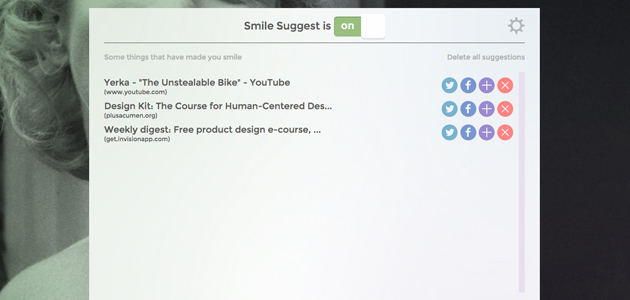
Browsing and Smiling?

Liking what we browse on the Internet has become the standard. We like, we share, we save it for later.
Martin McAllister has come up with a different approach to these interactions, by basing recommendations on emotion rather than content.
So at Yu Centrik, we gave this new browser plug-in a try — along with a few grins.
The Chrome extension is called Smile Suggest and it “saves the pages that make you smile so you can share and bookmark them” using facial recognition technology.
After installing the extension, you are presented with your own image via your webcam. Simply give your best smile and rate it on a scale of 1 to 10.
When the plug-in is in use, the webcam remains active to capture your smiles in reaction to what you are browsing.
So this made me wonder: could I bookmark according to other emotional reactions?
I then tried a few variations to see if I could save pages that I disliked by frowning, pages I found funny by laughing, and content I found sad by moping. I was thrilled by the idea of emotional mapping and was curious to see how it could potentially change the way we surf the web and share our thoughts on social networks.
Unfortunately the facial recognition only works with smiling, which was disappointing. After a week of making funny faces at my computer, Smile Suggest had only saved 3 links: a blog post, a YouTube video, and an online invitation for an awesome course. What does this mean?

The technology only recognizes one smile at a time. There is no ranking according to the size of your smile, no variation of emotions, only the initial big smile you captured.
Furthermore, the caption is best made when you consciously smile at your screen, which reduces the serendipity of the core idea.
I realized that by smiling at my screen, I have a new awareness of my relationship with my computer that slowly became a “he” rather than an “it”.
However, this new personality made me feel somewhat under surveillance. For those who cover-up their webcam, this is not for you. It does make you conscious of what you are doing and who could be watching. In that sense, you do experience those other emotions like curiosity, guilt, and even a bit of fear.
If Smile Suggest did detect other emotions, imagine how the collected data would change the way corporations could reach us by understanding how we really react to their websites, applications, and advertising.
For now, the experience is interesting, but I wish it did more. Until then, Smile Suggest temporarily changed the way I interacted with my computer — and I smiled more often!
We invite you to give it a try and let us know what you think.
—–
Source: New feed
0 Comment(s)